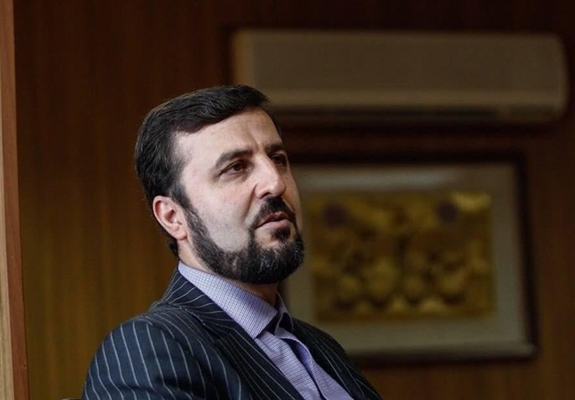Iran’s Permanent Mission to the International Atomic Energy Organisation Kazem Gharibabadi says Tehran has asked the IAEA to introduce another inspector.
After attending a meeting of the IAEA Board of Governors to discuss a safeguards issue and the status of one of the IAEA’s inspectors in Iran, Gharibabadi explained new aspects of the matter, criticising the holding of immediate meetings to examine two common issues that have no immediacy.
He said the issue has been criticised by some other countries as well.
Regarding the suspected anti-security action by the IAEA inspector, he said Tehran has presented a detailed report to the Board of Governors and the Agency on this issue.
“On October 28, 2019, a team of inspectors paid a visit to the Natanz Nuclear Site and, as usual, a routine inspection process was performed at the entrance to the complex, using special chemical detection devices to detect a range of explosives containing Nitrates. During the routine inspection process, the alarms on a certain person reoccurred, and the security team repeated this process several times, but the results were the same for the same inspector.”
The Iranian ambassador noted that the security team suspected that the alarms might be lit because of the inspector’s clothes or his personal belongings.
“The security team even checked the toilets used by the inspector with special devices but they released more alarms. With the consent of the inspector, and in the presence of him and his colleagues, and in coordination with the Agency’s authorities, security guards visited his residence and checked some of his belongings and medications, but his medications had no problem. However, the machines gave alarms on his empty handbag. After contacting the IAEA Secretariat and with the agreement of the IAEA authorities, some sampling was carried out on the same handbag and it was jointly sealed,” stressed Gharibabadi.
Fars News Agency quoted Gharibabadi as saying that from the very beginning, the IAEA inspectors reported the issue to the relevant authorities at the organisation’s headquarters in Vienna, and the secretariat was in full contact with the Iranian Safeguards Department and Iranian Permanent Mission in Vienna.
“Nothing can replace the Agency’s commitment to cooperate in the investigation of possible violations by its employees or inspectors. As stated in the relevant provisions of the Agency’s Immunities Agreement, the Islamic Republic of Iran is fully aware of the immunities of the inspectors and has, over the years, cooperated with the Agency under all circumstances, and demonstrated its compliance with agreement.”
It goes without saying that Iran, like all other members of the IAEA, cannot ignore any behaviour or action against the safety and security of its nuclear facilities, particularly that there were some efforts to sabotage Iran’s nuclear sites in the past, he added.
At the end, Gharibabadi pointed out that repeated measurements using different diagnostic equipment showed the same results. Therefore, there is no doubt that there existed some suspicious material in the case.
“The results of the sample examination by Iran and the Agency may provide further information on the nature of the materials in future. In order to complete the current investigation, consultations between Iran and the Agency on this issue are ongoing, and Iran expects the Agency to offer necessary and appropriate cooperation.”
On the issue of safeguards discussed at the Board of Governors Iran’s mission to Vienna also said that Tehran has commitments in the three areas of the JCPOA, the Additional Protocol and the Safeguards and is cooperating with the Agency in this regard.
“In the meantime, if there are any questions or ambiguities raised by the Agency, we will do our best to investigate them and take the necessary action. The process is ongoing and there is no particular concern or urgency, as some countries have put it.”
Gharibabadi added that he emphasised that Iran cooperates extensively and constructively with the IAEA, in a way that it accepts 20% of IAEA inspections and on average there are three inspectors in Iran every day.
“Therefore, this level of cooperation should be appreciated, and the Agency and some countries should refrain from exaggerating some of the common issues that can be resolved through routine interactions between Iran and the Agency. Otherwise it will have a detrimental effect on cooperation,” he concluded.
